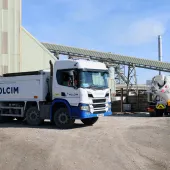Aggregate Industries upping the ante on safety

Quarrying firm says safety should not remain in the silo for the construction sector
FOLLOWING a recent report that construction is the UK’s second most dangerous industry, Aggregate Industries are reminding the sector that collaboration is key to raising safety standards for everyone.
Perhaps unsurprisingly, a new study compiled by the Office for National Statistics (ONS) has found, on looking at workplace mortality figures, that construction workers are subjected to some of the most dangerous working conditions in the UK, second only to farming.
The consensus was that the inherent hazards presented by dealing with heavy machinery and working at height put workers at risk of suffering injuries related to falls, slips and other accidents.
While most construction firms do have robust health and safety strategies in place to alleviate on-the-job risks as far as possible, Aggregate Industries assert that suppliers also have an integral part to play.
Richard Wilson, head of health and safety at Aggregate Industries, said: ‘Construction health and safety has come a long way over the past couple of decades, on account of new legislation and more serious investment in health and safety systems.
‘However, there is still much work to be done – the figures are still far too high with 43 workers fatally injured in the construction sector 2015/16.
‘As an industry, it is important to come together to address this. By involving suppliers earlier on in the supply chain, for example, businesses can look to share ideas and benefit from informed guidance when it comes to the safe delivery, movement and supply of goods.’
As a business committed to driving the safety agenda, Aggregate Industries have launched a number of new initiatives over the past year in a bid to help customers enhance the safety of their workforce.
This includes the recent introduction of moving-floor trailers (pictured), which use an in-built moving floor to discharge product in the desired location, thereby offering much greater vehicle stability and alleviating the tipping risks associated with traditional articulated tipper trucks.
Also, in London, the company’s London Concrete team is fully FORS compliant. As such, all drivers have had training to meet the required standard, ensuring they have high a high level of road-safety awareness, whilst all truckmixers are fully compliant and equipped with extra mirrors for increased visibility.
Mr Wilson added: ‘In addition to investing heavily in the health and safety of our own workforce, we are committed to doing everything we can to help customers ensure safety on site – from ensuring ease of handling of product through to improving road safety. These are just a number of initiatives we have in the pipeline.’









